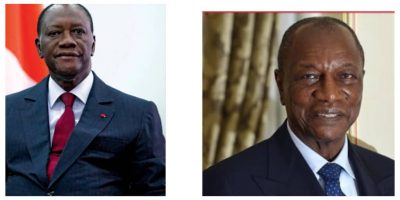
The sit-tight syndrome is not new to the African landscape. It has been a recurring trend that has characterized African politics for decades. Even with the advent of democracy in most nations on the continent, this ugly phenomenon still finds a way to rear up it’s ugly head.
The sit-tight syndrome is a phenomenon that connotes the willful, deliberate suspension of laid down rules or regulations by an individual to stay longer in office outside the span of his tenure.
Recently, the political situations in Ivory Coast and Guinea has further butressed this fact. The controversial 3rd term Bid’s of presidents Alpha Conde and his Ivory Coast counterpart Alassane Ouattara has raised the prospects of political tensions in both countries.
In Guinea, 82-year old President Alpha Conde made his intentions known to the populace that he would be contesting in the October 8th presidential elections. This was a move seen as controversial and against the laws of the constitution. Conde has been in power since 2010, leading a nation that has been ‘wounded’ by years of repression, brutality, Human Rights abuse among others.
His accession to power in December 2010 was the country’s first genuinely democratic handover in its 52-year history and now in a bid to retain power, has led to reverse of the Democratic situation which brought him to power.
The Guinean presidential elections held under tense circumstances, and it remains to be seen if the result swings in favour of President Alpha Conde even as The wait for the results continue. The opposition candidate, Cellou Dalein Diallo has declared himself winner of the elections, but the electoral commission has called his announcement ‘premature’ as the votes are still been counted. As the wait continues, amidst controversies, it remains to be seen the effects this would have on The Guinean political landscape.
In Ivory Coast, president Alassane Ouattara’s controversial 3rd term bid is Also threatening to disrupt the country’s polity ahead of the October 31st elections.
This move is seen as unconstitutional and controversial which had sent ripple effects across the nation. Ivory Coast was once the most stable democracy in West Africa, but in recent times has seen it’s democracy shaken. Ouattara’s announcement to run in the elections was met with violence and anger among sections of the populace.
Many fear these circumstances may bring echoes of the political crisis that struck the nation in times past. The aftermath of the revolution that occurred during the time of former president Laurent Gbagbo.
Although the president’s bid enjoys the backing of court, it has not gone down well with many. As things continue to unfold, it remains to be seen how the political situation in Ivory Coast plays out ahead of the presidential elections.
Sit-tight syndrome among African leaders has disrupted political stability In many countries in Africa for years. It is a trend that seems to have eaten deep into the fabric of African politics. Individuals who are elected into positions gradually become ‘power-drunk’ and sit-tight in these offices, trampling on the constitution and forgetting that it is the people who have the power.









